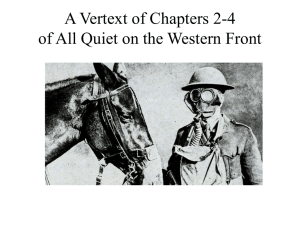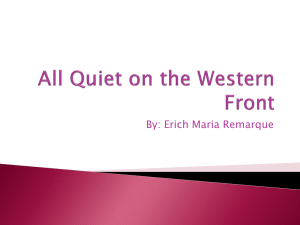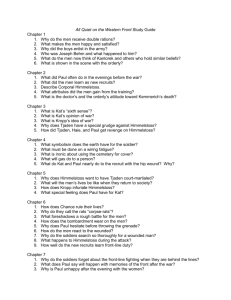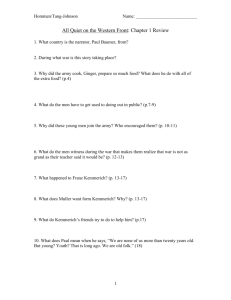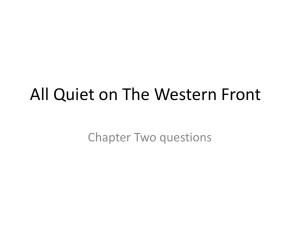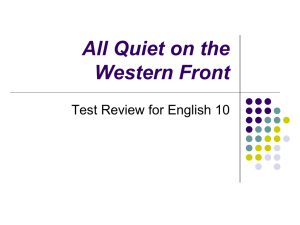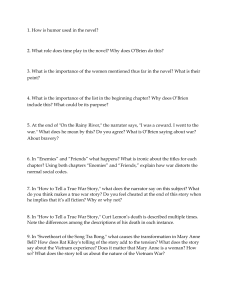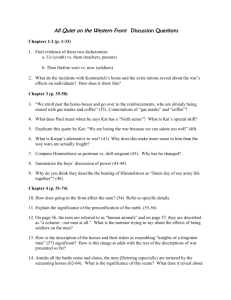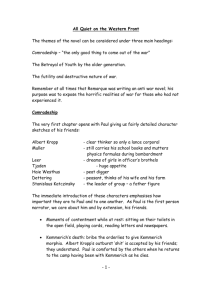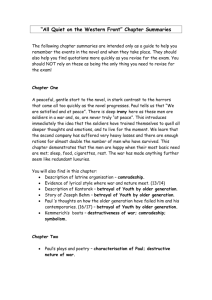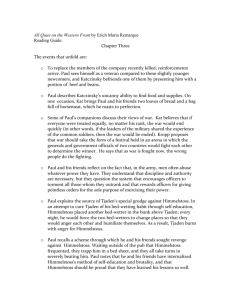Study Guide AQWF 2012.doc
advertisement
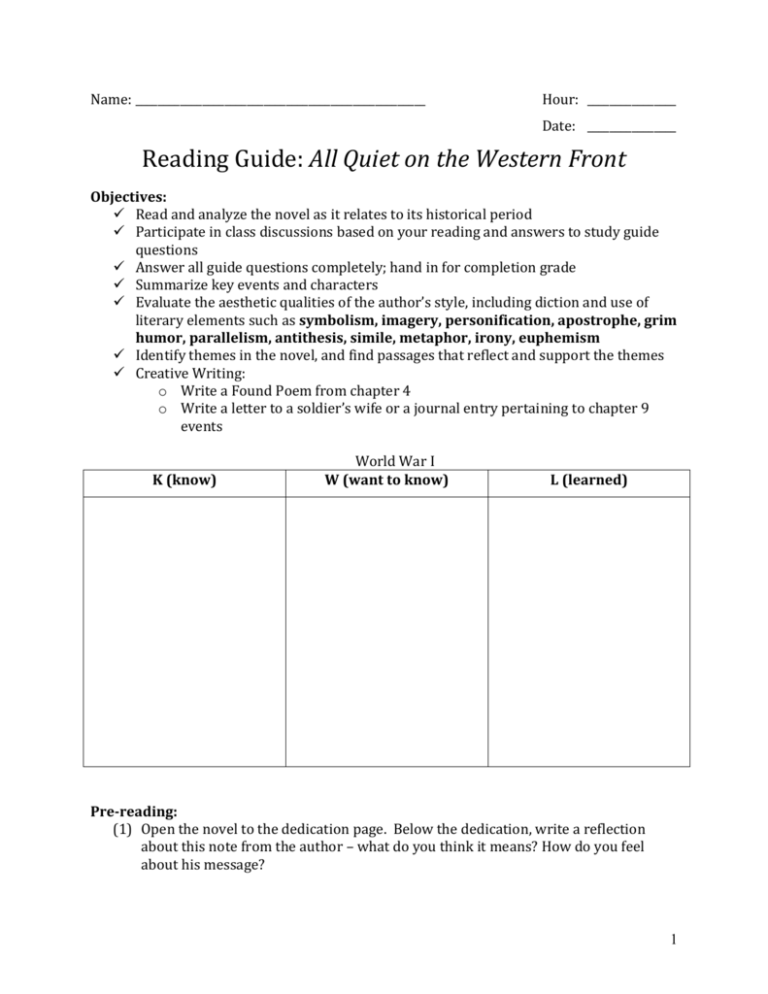
Name: ____________________________________________________ Hour: ________________ Date: ________________ Reading Guide: All Quiet on the Western Front Objectives: Read and analyze the novel as it relates to its historical period Participate in class discussions based on your reading and answers to study guide questions Answer all guide questions completely; hand in for completion grade Summarize key events and characters Evaluate the aesthetic qualities of the author’s style, including diction and use of literary elements such as symbolism, imagery, personification, apostrophe, grim humor, parallelism, antithesis, simile, metaphor, irony, euphemism Identify themes in the novel, and find passages that reflect and support the themes Creative Writing: o Write a Found Poem from chapter 4 o Write a letter to a soldier’s wife or a journal entry pertaining to chapter 9 events K (know) World War I W (want to know) L (learned) Pre-reading: (1) Open the novel to the dedication page. Below the dedication, write a reflection about this note from the author – what do you think it means? How do you feel about his message? 1 Characters: Chapters 1 – 5 introduce most of the major characters in the novel. As you read, make notes about each character’s traits, actions, and attitudes in the chart below. Include a direct quote which you feel exemplifies each character. Character Traits, Actions, Attitudes & Perspectives, Feelings, Quotes 2 Chapter 1 Voracity (p. 1): Vocabulary & Discussion Questions Disconcerted (4): Synthetic (7): Indigent (8): Trifle (8): Pithily (8): Confounded (11): Ostracized (11): Mutineers (13): 1. In the opening scene, why does Paul’s company have extra food to eat? What is Ginger’s initial response, and why do you think he responds this way? 2. Why is Franz Kemmerich dying? How are Müller’s feelings about Kemmerich’s dying different from Paul’s feelings? 3. Who, in general and specifically, represents the older generation? How does the narrator feel about the older generation? Copy a line (& page number) exactly from the text to support your answer. 4. “We are the Iron Youth.” – Kropp (18) Who has given Paul and his comrades this title? What does it imply? Interpret the narrator’s response to this title. 3 Chapter 2 Threshold (20): Profoundly (21): Renunciation (23): Discomfiture (25): Convalescent (30): Revile (32): 1. Describe the relationship between Himmelstoss and the men in his platoon. 2. Contrast the narrator’s life before entering the war with his training camp experience. Life before entering war Life @ training camp 3. What does the narrator say is the “finest thing that arose out of the war”__________________ 4. What does Paul think about Müeller’s desire for Kemmerich’s boots? 5. How does Paul try to soothe Kemmerich? What is most difficult for Paul in Kemmerich’s last moments? 6. “We learned that a bright button is weightier than four volumes of Schopenhauer.” (21) Reread this quote from the text and the following few sentences. What is the narrator saying they learned? 4 Chapter 3 Prussians (36): Patronizingly (36): Monotonously (42): Decorum (44): Felled (48): Indefatigable (49): Remonstrance (49): 1. What is the bet Kat and Kropp make? Who wins? Why do they act in such an unsympathetic manner? What theme is exemplified by this incident? 2. Find an example of apostrophe in chapter 3 and reference it here. 3. Reread the argument Kat and Kropp have over the war (41). What is Kat’s stance? What is Kropp’s? What is each man suggesting (the thought behind his words)? 4. Describe the manner in which the soldiers exact revenge on Himmelstoss. Do you think the soldiers’ behavior is acceptable? Why or why not? 5 Chapter 4 Drone (51): Acrid (52): Rent (54): Indigent (56): Perpetual (58): Teems (59): Tapering (59): Baseness (64): 1. Find an example of liturgical prose in chapter 4 and reference it here (indicate page #). 2. Find an example of allusion in chapter 4 and reference it here (indicate page #). 3. Find an example of personification and write it here (indicate page #). 4. There are several instances of compassion shown by the men during the battle. Find two and describe what happened. 5. What do you think the coffins and dead bodies that fly out of them symbolize? 6 Chapter 5 Insatiable (77): Laconically (78): Disconcerted (82): 1. Discuss the example of grim humor that appears in the opening of Ch. 5. 2. Müeller asks each man what they would do “if it were suddenly peace-time.” What is each man’s response? a. Albert Kropp: b. Kat: c. Haie: d. Tjaden: e. Detering: 3. What are some of the ways the men show disrespect to Corporal Hilmelstoss when he appears at the front? Why are they able to get away with treating a superior officer this way? 4. Find the euphemism on page 83, write it, then explain it. 5. Reread pages 84 – 87 - a conversation between Kropp, Müeller, and Paul - up to the line where Albert Kropp sums up the conversation with, “The war has ruined us for everything.” What is each of the 3 men feeling/concerned about? Then, explain what Kropp means by “The war has ruined us for everything.” 7 Chapter 6 Repulsive (102): Cleaves (104): Dementing (106): Directions: Chapter 6 gives a vivid account of life in the trenches. As you read, record instances of imagery and feelings (indicate pg. #). Feel free to add circles as needed. Sounds Sights Trench Warfare Smells Feelings 8 Chapter 7 Quixotic (139): 1. Paul must leave the front. Where is he going, and how long will he be away, and what is weighing on his mind? 2. Find the example of parallelism and reference it here. How does the author’s use of parallelism here contribute to the meaning of the text? 3. Why is Paul irritated with the young red-cross sister who offers him coffee? 4. Paul “discusses” the war with his family and a German-master (Herr Major & his friends at a bar). What is their perception of the war? 5. Re-read p. 157-158. In your own words, describe the intensity of the emotions Paul is feeling. Name an emotion he is experiencing, and write the line or phrase that explains it. 6. What do Paul and his sister wait in line for, and why do they do that? 7. There are at least 2 examples of repetition in this chapter. Write one of them: 9 Chapter 8 Opalescent (188): Furtively (190): Apathetic (193): Obscure (193): Abyss (194): 1. Reread the passages on 188 – 189 where Paul describes nature. Find a line you really like that contains imagery and highlight it. What do you think is the author’s purpose for including these (among many others) descriptions of nature? What theme is the author expressing? 2. Remarque presents a human picture of the enemy through Paul’s eyes. Explain how he does this, and include an example in your explanation. 3. How do some of the Germans exploit the Russian POW’s? How does Paul feel about this? 4. An example of antithesis is found on 193-194. Reference it here, and then explain in your own words what Paul is saying. 5. One of the Russian POW’s finds out that Paul plays piano. What does he do for Paul, and how does it make Paul feel? 6. What does Paul’s father do for a living? 10 All Quiet on the Western Front Creative Writing, Chapter 9 You are Paul Bäumer, in the shell-hole when the Frenchman lands in the same place. Instinctively, you stab him with your knife. It is an automatic, drilled reaction. The Frenchman does not die right away. He is fatally wounded, but it takes almost a day until he passes on. You must remain in the trench with the man you have killed. You sort through his belongings, noting his name, his family pictures, and several letters from his wife. You stay in the shell hole for another day before you are able to return to your company safely. Choose and complete one of the following. Before writing, you must reread pages 216 - 226 in the story so that you can incorporate the facts into your writing. This is to be handed in on __________________. 1) Write a letter to Gérard’s wife. Explain to her how her husband died and your part in the killing. Be as descriptive and truthful as possible. Offer your condolences and suggest ways of making it up to her and her family. Emphasize how the experience has permanently affected you. 2) Write a diary entry explaining the situation. Describe the events that occur in the shell-hole, your involvement in the killing, and your subsequent reactions. Explain why you felt the urge to go through Gérard’s personals, and how knowing about his life has permanently affected your psychological well-being. Graded as follows: Content Creative Expression Flow of Ideas Mechanics ___/5 ___/5 ___/5 ___/5 11 Chapter 10 Fastidious (238): Hitherto (240): Surreptitiously (243): 1. Kat, Albert, Müler, Tjaden and Detering land a “good job:” 2. With what do the soldiers furnish the cellar? What kinds of food do they get? 3. What does Albert decide to do if they amputate his leg? 4. Why do surgeons amputate on the “slightest provocation”? 5. Why does Paul refuse chloroform? 6. Why does Paul bribe the sergeant-major with cigars? 7. Why does Paul ask the red-cross sister to take the sheet off the bed? 8. What does it mean that Josef Hamacher has a shooting license? 9. Why does Josef warn the 2 young new arrivals not to let the chief surgeon operate on their feet? 10. How does Peter triumph? 11. What does Paul say the “keenest brains of the world” do? 12 Chapters 11 – 12 - Epilogue Forlornness (272): Banal (272): Subtly (273): Despicable (277): Aberration (277): Obliquely (278): Lowers (279): Superfluous (294): 1. In the opening of chapter 11, about how long have Paul and his company been stationed on the Front lines? 2. As you read p. 278 - 281, note passages that you feel might be foreshadowing. 3. What binds the men together? In other words, what solidifies their “brotherhood?” 4. “In the quiet hours when the puzzling reflection of former days like a blurred mirror, projects beyond me the figure of my present existence, I often sit over against myself, as before a stranger, and wonder how the unnameable active principle that calls itself to life has adapted itself even to this form” (273). What do you think Paul means with these words? 5. Who dies in this chapter, and how do they die? 13 Post-reading: 6. Did you expect the novel to end the way it did? Why or why not? Do you thing the ending is appropriate, or would a different ending fit the novel better? Explain. 7. What makes this novel a classic and “The GREATEST WAR NOVEL of ALL TIME” (quote from cover of novel). 14
